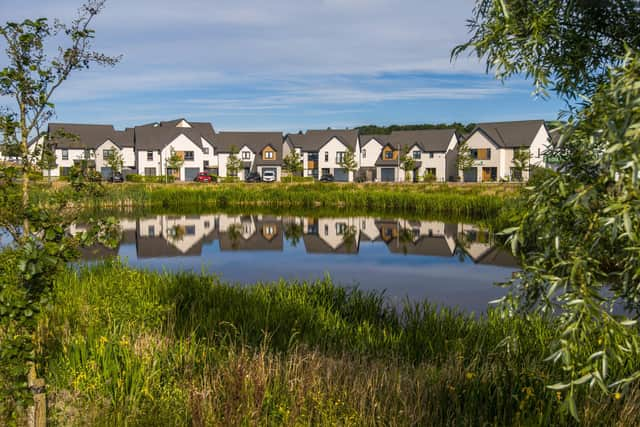Major Scottish housebuilder sees signs of increasing homebuyer confidence after slump in profits
Scotland’s only listed housebuilder and one of its most significant players has pointed to some green shoots of recovery in a housing market that has weighed heavily on its sales and profits.
Reporting results for the six months to the end of November, which revealed that revenues had fallen by a quarter, Springfield Properties said it had been “encouraged” by an improvement in private housing reservations in recent weeks amid signs of increasing homebuyer confidence. It follows a torrid time for Britain’s housebuilders amid soaring interest rates, rising costs and a slump in sales. The downturn recently claimed the scalp of Aberdeen-headquartered Stewart Milne Group, which had been going for nearly 50 years, with the loss of 200 jobs.
Advertisement
Hide AdAdvertisement
Hide AdSpringfield’s chief executive Innes Smith said: “We have been pleased to see sales pick up in January and February as interest rates have levelled out and inflation figures have been coming down. The intention has been to get the company as strong as possible so that we can take advantage of a really good land bank when things pick up.


“There is a slightly stronger market in Scotland than down south. Demand is always there but we are not as a nation building enough houses. We need politicians to really realise the benefits to local communities and the wider economy in building new houses. And the houses we build are also very energy efficient so there is a green side to this as well.”
The group has been saddled with relatively high levels of debt, though it has embarked on a series of land sales in an attempt to reduce this. The first-half results showed that revenues fell 25 per cent to £121.7 million, compared with £161.9m a year earlier. Profit before tax tumbled 80 per cent year on year to just £1.2m. Net bank debt was up 38 per cent to £93.4m. Bosses confirmed that they were pausing shareholder dividend payments until the bank debt is “materially reduced”. That debt pile is expected to have been slashed to around £55m by the end of May.
Springfield, which was established in Moray and floated on the stock market in 2017, said build cost inflation was continuing to reduce and stabilising at around 2.5 per cent. It stressed that the long-term fundamentals of the Scottish housing market remain strong with an undersupply of housing “across all tenures” and greater private housing affordability than the UK as a whole.
Smith said: “Trading for the first half of the year was in line with our expectations, and reflects the challenging market conditions experienced across the industry. To mitigate the impacts of the downturn and ensure we are in a stronger position for when trading conditions recover, we took decisive actions to maximise cash generation and reduce our debt by year end. A key element of this was actively pursuing profitable land sales. We are pleased to have agreed sales worth £18m so far and we expect to conclude negotiations for further sales in the near term.”


He pointed to strong demand in affordable housing, with the group having signed contracts worth in the region of £40m since the end of last May. The firm is hopeful that the ending of the Scottish Government’s emergency rent cap this April will enable a return of private rented sector (PRS) activity.
Smith added: “The fundamentals of our business and our position within the Scottish housing market remain strong. We have one of the largest land banks in Scotland with over 6,421 owned plots, 86 per cent of which has planning permission, and a further 3,217 acres of strategic land.”
He said the collapse of Stewart Milne had been “very sad” for the supply chain and the workers affected and highlighted how difficult conditions have been for small to medium-sized housebuilders. “The risk is we just end up with large multinationals,” he added. “Scotland has a lot of rural areas that need housing and you tend to have lower sale prices and higher costs there. Some of the government policies that come in are really for the Central Belt and don’t take into account these rural areas. We haven’t operated in Aberdeen as it has always been quite a volatile market.”
Advertisement
Hide AdAdvertisement
Hide AdMorayshire-based Springfield, which has grown in scale following the twin acquisitions of Tulloch Homes and Mactaggart & Mickel Homes and now has some 50 sites in Scotland, told investors: “With a large number of sites with planning already in place, the group is able to quickly accelerate site development as market conditions improve and is well-placed to satisfy pent-up demand for high-quality, energy efficient housing in attractive locations across the country.”
James Tetley, an analyst at Equity Development, said: “Springfield has reported encouraging H1 results. There have been several signs in recent weeks that the housing market has made a bright start to 2024, particularly in Scotland. These include January’s RICS survey, which highlighted an improvement across all sales market activity indicators, and recent house price inflation data (Halifax recording +4 per cent in January in Scotland versus +2.5 per cent for the wider UK). Encouragingly, Springfield has also seen an increase in private housing activity.”
Greg Poulton at Singer Capital Markets said Springfield’s shares were “attractively valued” and underpinned by a large, high quality land bank. “Springfield offers growth potential over and above the more established UK housebuilders,” he added.
Comments
Want to join the conversation? Please or to comment on this article.